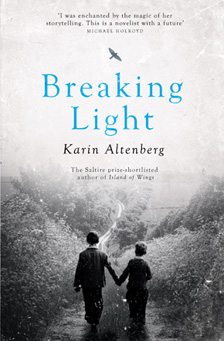Breece D’J Pancake: ‘Trilobites’
by Karin Altenberg Breece D’J Pancake is a legend amongst some of my writing friends – but, like any artist dying young, his legacy is coloured by the shadow of the great work that he could have gone on to create. Once you have read his only collection of stories, published posthumously in 1983, you will most likely, as I did, grieve for the loss of such genius. His stories seem perfect to me. His tone is distinct, the description so precise you can smell the dust and taste the sweat and yet he does not stoop to simple seduction, or some easy clarification of life’s complexities.
Breece D’J Pancake is a legend amongst some of my writing friends – but, like any artist dying young, his legacy is coloured by the shadow of the great work that he could have gone on to create. Once you have read his only collection of stories, published posthumously in 1983, you will most likely, as I did, grieve for the loss of such genius. His stories seem perfect to me. His tone is distinct, the description so precise you can smell the dust and taste the sweat and yet he does not stoop to simple seduction, or some easy clarification of life’s complexities.
Chekhovian in impetus, but closer to poetry than prose, these stories often feature a lonely young man in a dreary small community, hiding his dreams and thoughts from the world. This character is surrounded by rough, often violent, working men – miners, labourers, boxers – ageing, failing parents and women: despised or desired, but never granted a soul. This vision of reality, one senses, is Pancake’s own in both life and work.
Breece D’J Pancake was born in Charleston, West Virginia in 1952 and died in 1979, at the age of twenty-six, from a self-inflicted gunshot wound to the head. No one has claimed to have fully known him. Like his characters he seems to have been torn between an Appalachian hillbilly lifestyle, close to the land and the bottle, and a social ambition, a wish for a kind of old-fashioned ennoblement. Whilst studying creative writing at the University of Virginia, he dated – and was jilted by – girls above his own class. At the same time he kept a cupboard full of guns and would go off hunting on his own in the hills. Living such a conflicted life must have been painful; as James Alan McPherson writes in his introduction to the collected stories: “He was working toward becoming an aristocrat in blue jeans,” and goes on to say that, “while he was alive there were many of us who could not understand who or what he was.” I think this is the case with the writing too: I’m not always clear about what it means – but the way he speaks his own truth widens my world.
‘Trilobites’ was Pancake’s first story, published in The Atlantic in 1977. It opens, typically, when things are already disintegrating. Colly gets out of his truck in a small town in West Virginia on a hot summer’s day. His father is recently dead, the harvest has failed, the loansman is after the farm. There is a sense of stasis – something to do with how the town sits, irreversibly, next to Company Hill. But there is something else too: anticipation – or dread, perhaps. Colly is expecting the return of his former girlfriend, Ginny, who escaped the provincial life after school and went off to college in Florida.
“The air is smoky with summertime. A bunch of starlings swim over me. I was born in this country and I have never much wanted to leave. I remember Pop’s dead eyes looking at me. They were real dry, and that took something out of me.”
 Back at the farm it is clear that Colly is bound to the land – by his feelings of duty towards the farm his father built and, more intricately, by a kind of communion with the ancient geography that shaped the landscape. He can almost feel the “cold waters and the trickling the trilobites make when they crawl.” This connection seems essentially spiritual and briefly shuts out his anxieties and emotions: “My father is a khaki cloud in the canebreaks, and Ginny is no more to me than the bitter smell in the blackberry briers up on the ridge.”
Back at the farm it is clear that Colly is bound to the land – by his feelings of duty towards the farm his father built and, more intricately, by a kind of communion with the ancient geography that shaped the landscape. He can almost feel the “cold waters and the trickling the trilobites make when they crawl.” This connection seems essentially spiritual and briefly shuts out his anxieties and emotions: “My father is a khaki cloud in the canebreaks, and Ginny is no more to me than the bitter smell in the blackberry briers up on the ridge.”
The two basic moods of this story are stasis and a kind of threatening anxiety: a lack of confidence bordering on fear. Colly is skinning a freshly caught turtle in the creek when he’s disturbed: “I shiver a little, and look up. It’s only the loansman standing on the creekbank in his tan suit. His face is splotched pink, and the sun is turning his glasses black.”
The loansman, dodgy in his bad suit, is out to buy the farm, which currently belongs to Colly’s mother. Colly tells the loansman that she will probably sell. Giving it up in this way – by not resisting the sale – brings equal feelings of guilt and relief. Colly tells himself that he is useless, that he couldn’t keep the farm going. Nor does he want to follow his mother who’s leaving for Akron. He tells her so, and speaking his mind frightens him: “I talked back. I’ve never talked back, I’m scared, but I stop shaking.”
At this point Ginny seems to offer the only way out. But Ginny, when she finally arrives, is altered. She “speaks through her beak” and pretends not to remember the message of love he wrote in her yearbook. They drive to the depot where Colly learns that Ginny has a boyfriend – a marine biologist in Florida. The emotional pressure is building and he tries to explain his feelings about the land – and his place in it – but she doesn’t understand. He cannot reach her like he used to. And so he rapes her. Afterwards she drives off, leaving him feeling “old as hell”.
At the end of the story Colly’s inner life remains a mystery. Pancake doesn’t offer a solution but he presents this young man’s life with such emotion and beauty that I am overcome with compassion for both the character and the author.
The trilobite is a central metaphor to this story. It perfectly mirrors Colly – calcified, tightly curled, petrified, turned in on itself and at the same time an ancient thing that is part of some greater cosmos.
The landscape of West Virginia, with its ancient hills and valleys, the coal mines and trailer parks, was Pancake’s birthright, as was his extraordinary talent as a writer. His ability to express the mystery of this existence was his genius and, perhaps ultimately, his downfall.
 Karin Altenberg was born in Sweden and moved to Britain to study in 1996. She holds a PhD in Archaeology. Her first, bestselling novel, Island of Wings, was shortlisted for the Saltire First Book Award and the Scottish Book of the Year Award and was longlisted for the Orange Prize for Fiction. Her second, Breaking Light is published in hardback and eBook by Quercus. Read more.
Karin Altenberg was born in Sweden and moved to Britain to study in 1996. She holds a PhD in Archaeology. Her first, bestselling novel, Island of Wings, was shortlisted for the Saltire First Book Award and the Scottish Book of the Year Award and was longlisted for the Orange Prize for Fiction. Her second, Breaking Light is published in hardback and eBook by Quercus. Read more.
Breece D’J Pancake’s Trilobites and Other Stories is published by Vintage Classics.

